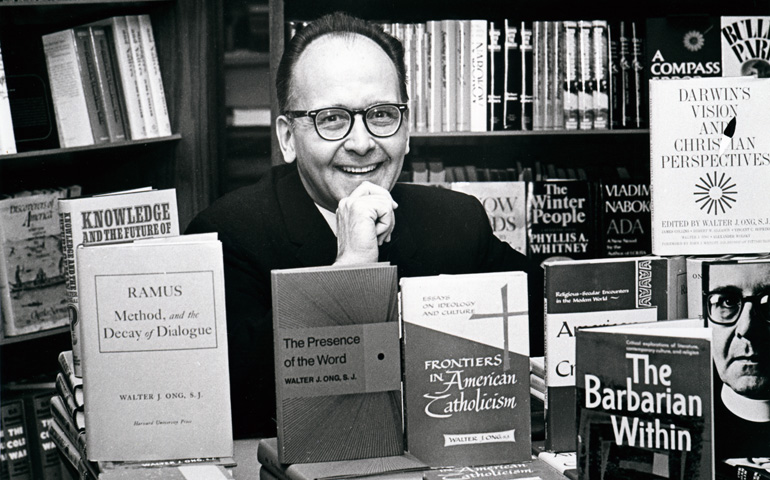
Jesuit Fr. Walter Ong (Courtesy of St. Louis University Libraries Special Collections/Richard Finke)
A two-day conference at Gonzaga University this week will delve into the work of Jesuit Fr. Walter Ong, a well-known scholar-philosopher and one-time student of famed philosopher and communications theorist Marshall McLuhan (1911-1980).
"Technology, Rhetoric and Cultural Change: Walter J. Ong, S.J. In the Age of Google, Facebook, and Twitter" will draw scholars and participants from across the country to the Spokane, Wash., campus Friday and Saturday to delve into Ong's work, which dealt largely with the evolution of orally based cultural communication to the written and how that development impacts culture and human consciousness.
"As enthusiasts of new media daily claim its transformative status, the conference will explore -- using the lens of Walter Ong's scholarship -- these powerful new communication tools and the emerging world they promise," a Gonzaga news release stated.
Considered among the foremost theorists of rhetoric in the 20th century, Ong (1912-2003) published several books and hundreds of essays on the relationship of communication technology and human self-awareness. He is considered a peer of McLuhan.
While Ong's scholarship drew a global following, the priest's base was St. Louis University, where he taught for three decades and which has established The Walter J. Ong, SJ Center for Language, Media and Culture. The center "encourages scholarship in Communication, English, History, Theology, Modern and Classical Languages, and Philosophy," its website states. Ong leaned on all those disciplines in his writing, lectures and teaching.
St. Louis University English professor Sara van den Berg will deliver a keynote address Friday evening, "The State of Ong Scholarship." Regis University religious studies professor Randolph Lumpp will offer Saturday's concluding keynote, "Going Global with Walter Ong: The Society and the Site" at 3:15 p.m.
The conference is to be held at GU's Jepson Center for the School of Business Administration.
Other lecturers will include Gonzaga communication professor John Caputo on "Walter Ong: How the Seamless Web of Technology Is Restructuring Consciousness."
In 1941, Ong earned a master's degree in English from SLU. His thesis on "sprung rhythm" in the poetry of Gerard Manley Hopkins was supervised by McLuhan, then a young Canadian.
It is said McLuhan influenced Ong's decision to refocus consequent research on Peter Ramus (1515-1572), a French humanist, logician and educational reformer. That scholarship led to the writing of one of Ong's major works, Ramus, Method, and the Decay of Dialogue (1958). The book was rereleased in 2005.
McLuhan is said to have drawn upon his former student's scholarship on Ramism in the writing of his own key book, The Gutenberg Galaxy (1962).
Ong's doctoral dissertation on Ramus was overseen by Harvard University's Perry Miller (1905-1963), a high-profile American intellectual historian.
Ong was named a knight by the French government in 1963 for his work on Ramus.


